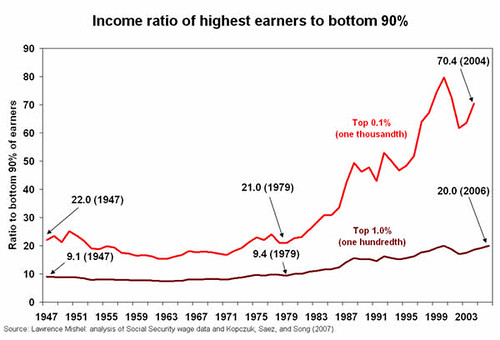Excluding the impact of the rebates and inflation, real disposable incomes were flat.And looking ahead, there's little reason to be optimistic according to this economist:
Over the next few months we'll see a return to non-stimulus numbers. And those probably won't be that good. Why you ask? How can someone get a raise when the job market is deteriorating?Wages and salaries grew just 0.3 percent in May according to the Commerce Department, and inflation only increased 0.1 percent, but that's not taking into consideration food and fuel inflation. (Inflation is actually above 5%.) The middle-class is barely treading water, and in many cases we're drowning.
Year over year job growth has been deteriorating for a long time, and unemployment is increasing. This is not an environment where an employee can say, "I need a raise."
There is one group that's doing well according to the EPI - the wealthy. [my emphasis]
Inequality in the United States continues to worsen. Huge gains at the top of the income scale have been fueled by, among other things, a surging inequality in wages (illustrated in the chart below). The ratio of the wage income of the top 1% of earners to that of the bottom 90% more than doubled between 1979 and 2006, increasing from a ratio of 9.4-to-1 to 19.9-to-1. [...]
But when it comes to the wage income of the highest of the high earners, the staggering gap has become a chasm: in 2004 the upper one-tenth of 1% earned 70.4 times as much as the average person in the bottom 90% of the income scale. Just 25 years earlier in 1979, the ratio that was only 21.0-to-1. In other words, in 1979 it took the highest-paid earners 12.4 days to make what most other earners did in a year, but by 2004 that feat was accomplished in a mere 3.7days.
 No wonder the University of Michigan's latest survey shows consumers are growing more pessimistic.
No wonder the University of Michigan's latest survey shows consumers are growing more pessimistic. The consumer sentiment index fell to 56.4 in June from 59.6 in May and 56.6 in mid-June. It's the lowest since 1980 and the third-lowest reading in the 56-year history of the survey.Also...
"Moreover, gas prices have risen to an all-time peak, food prices posted the largest increases in decades, home prices have fallen faster than any time since the Great Depression, and there has been widespread distress associated with foreclosures," the report added.You know conditions are bad when middle-class professionals resort to sleeping in their cars.

2 comments:
I didn't think this would happen to me.
The woman who said this isn't any different than the rest of us - she had a middle-class job as a loans processor, and now has lost her home and is sleeping in her car.
Millions of us are just a layoff or an outsource away from the same situation.
And the wealthy have to work almost four whole days before they make what the rest of us do in a year? Poor babies. Let's give them another tax break.
The vast majority of us are in the same situation, Abi. People are angry and scared. We played by the rules, paid our taxes, and tried to save for retirement, but its still not enough.
Hey, Washington: Instead of bailing out banks and giving tax breaks to the rich, how about helping the ones who need it most? That great vast majority that you've forgotten about.
Post a Comment